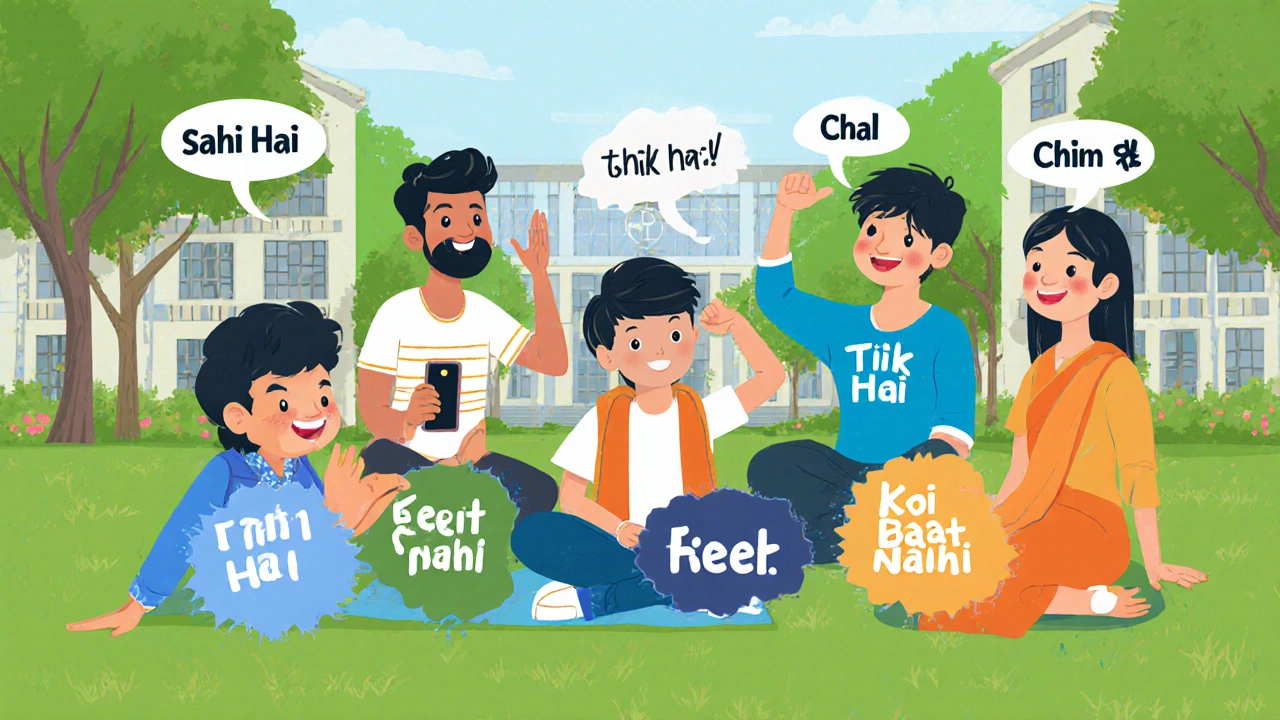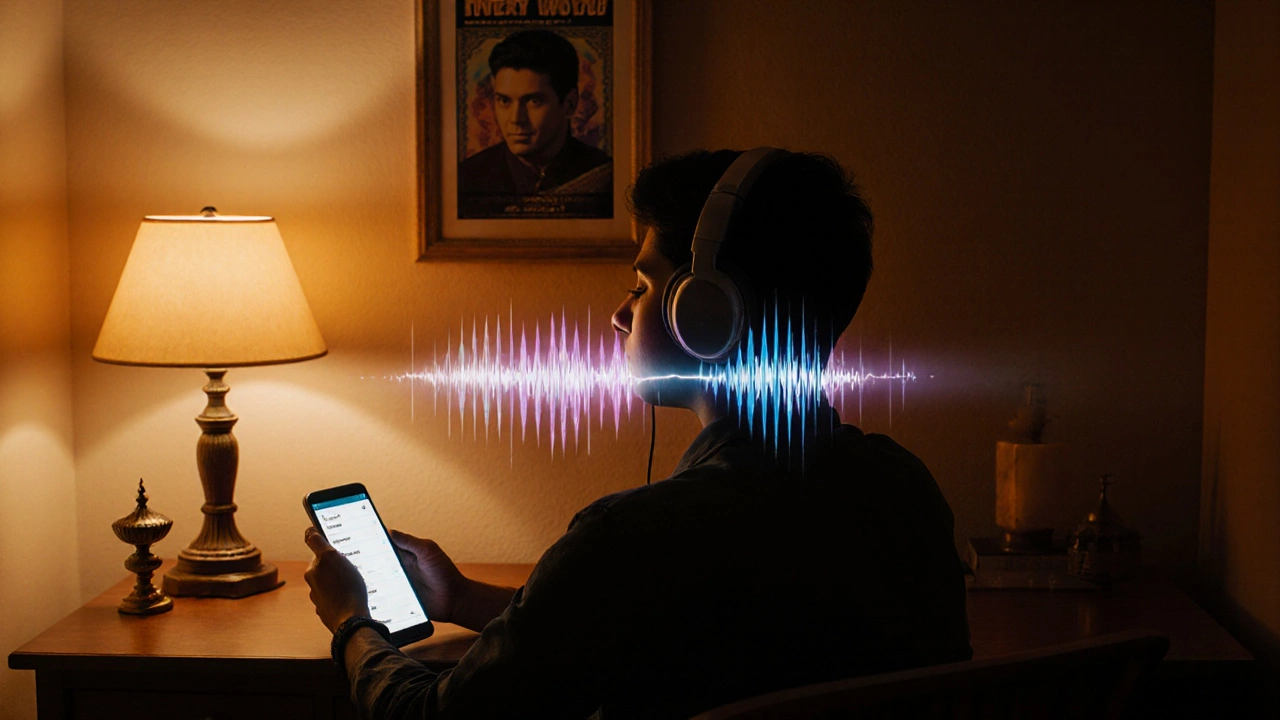Indian Slang for "Okay" - Interactive Guide
- Theek Hai – Neutral, polite
- Thik Hai – Casual, digital
- Sahi Hai – Enthusiastic approval
- Chal – Laid-back, youthful
- Koi Baat Nahi – Reassuring, calming
Ever heard an Indian friend say “Theek Hai is a Hindi phrase that translates to \"okay\" or \"alright\" in English.” and wondered what else they might use? This guide breaks down the most common slang expressions Indians use instead of a plain "okay," shows where each fits best, and gives you a quick cheat sheet so you can sound natural the next time you chat with a Hindi‑speaking buddy.
Key Takeaways
- "Theek Hai" and its variants are the go‑to slang for "okay" across North India.
- "Sahi Hai" adds a sense of approval, while "Chal" leans casual and can mean “let's go” or “fine.”
- Pronunciation matters - a short, clipped "theek" vs. a drawn‑out "thee‑k" can change the tone.
- Regional accents and age groups tweak these phrases; Southern speakers often prefer "Saripadi" for agreement.
- Use the cheat sheet and table below to choose the right slang for any informal setting.
Indian slang for "okay" isn’t a single phrase. It varies by region, age, and how informal you want to sound. Below we list the top five slang terms, explain their nuance, and give practical examples.
Common Indian Slang Terms Meaning “Okay”
Theek Hai is a widely used Hindi expression that literally means \"it is fine\". It works in almost any casual conversation, from agreeing to a plan to accepting a small favor. Example: "Are we meeting at 7?" - "Theek Hai."
Thik Hai is the same phrase with a slightly different spelling, common in texting and social media where the vowel is omitted for brevity. Use it when you want a quick, typed affirmation: "Send the file when you can." - "Thik Hai."
Sahi Hai translates to \"right\" or \"correct\" and conveys a stronger sense of approval. It’s perfect when you like something: "Your idea for the project?" - "Sahi Hai!"
Chal literally means \"let’s go\" but in everyday slang it also serves as an easy‑going "okay" or "fine by me". Younger speakers love it: "Do you want pizza or burgers?" - "Chal, pizza works."
Koi Baat Nahi means \"no problem\" and can replace "okay" when you want to reassure someone that everything’s fine. Example: "Sorry I’m late." - "Koi Baat Nahi, we’re still on schedule."
Regional Nuances & Tone
India’s linguistic landscape is huge, so the same slang can feel different depending on where you are. In the Hindi‑speaking belt (Delhi, Uttar Pradesh, Bihar), "Theek Hai" dominates. In Maharashtra, you’ll hear Marathi speakers sprinkle English with "Theek Hai" while also using "Barobar" (meaning "right"). In South India, especially Tamil Nadu, people may switch to a simple "Sari" or "Sari‑padi" to signal agreement, which loosely translates to "okay".
Age also matters. Teenagers and college students favour short, punchy forms like "Thik Hai" or "Chal," sometimes dropping the vowel entirely in chat ("thk"). Older generations stick to the full phrase and often add respect markers like "Theek Hai, Sir" or "Sahi Hai, Madam." Knowing who you’re talking to helps you pick the right level of formality.

Pronunciation Guide
Getting the sound right makes a huge difference. Here’s a quick phonetic cheat sheet:
- Theek Hai: /ˈt̪iːk ˈɦɛː/ - short “i” as in “see”, clear “k”.
- Thik Hai: /ˈt̪ʰɪk ˈɦɛː/ - softer “i” as in “bit”, slight breath after “th”.
- Sahi Hai: /ˈsɑːɦi ˈɦɛː/ - “sah‑hee”, stress on the first syllable.
- Chal: /tʃəl/ - like “chull” without the “l” sound at the end.
- Koi Baat Nahi: /koːi ˈbɑːt ˈnəɦiː/ - each word spoken clearly, “nahi” with a soft “h”.
Practice by listening to native speakers on YouTube or Instagram Reels - mimic the rhythm and you’ll blend in instantly.
When Not to Use These Slang Terms
Even casual slang has its limits. Avoid "Theek Hai" in formal business emails or when speaking to elders you haven’t met. In a job interview, say "Yes, that works for me" instead. "Chal" can sound dismissive if you’re responding to a serious request - reserve it for light‑hearted negotiations.
Also watch out for cultural context. "Koi Baat Nahi" is forgiving, but saying it after a mistake might imply you’re minimizing the issue. If a customer complains, a more sincere phrase like "Maaf kijiye, main sudharunga" ("I’m sorry, I’ll improve") is better.
Quick Cheat Sheet
- Theek Hai - General “okay”, neutral tone.
- Thik Hai - Text‑savvy version of Theek Hai.
- Sahi Hai - Strong approval, “that’s right”.
- Chal - Casual, often means “let’s do it”.
- Koi Baat Nahi - Reassuring “no problem”.

Comparison Table
| Slang | Literal Meaning | Typical Tone | Best Used With |
|---|---|---|---|
| Theek Hai | It is fine | Neutral, polite | Friends, coworkers, semi‑formal settings |
| Thik Hai | It is fine (short) | Casual, digital | Text messages, quick chats |
| Sahi Hai | It is correct | Enthusiastic approval | Positive feedback, praising ideas |
| Chal | Let’s go / fine | Laid‑back, youthful | Informal plans, peer groups |
| Koi Baat Nahi | No problem | Reassuring, calming | Apologizing, smoothing over mishaps |
Frequently Asked Questions
What does "Theek Hai" mean in everyday conversation?
It literally means "it is fine" and is used just like "okay" or "alright" when you agree with a plan, accept a request, or acknowledge information.
Is "Chal" appropriate for formal settings?
Generally no. "Chal" is very informal and feels youthful. In a business meeting or when speaking to someone senior, stick to "Theek Hai" or a full English "okay."
How do I pronounce "Sahi Hai" correctly?
Say "sah‑hee" with a soft "h" and stress the first syllable: /ˈsɑːɦi ˈɦɛː/.
Can I use "Koi Baat Nahi" after I make a mistake?
Yes, but it works best when you want to reassure the other person that the error isn’t a big deal. Pair it with a sincere apology if the mistake was serious.
Are there any regional equivalents I should know?
In South India, especially Tamil Nadu, people often say "Sari" or "Sari‑padi" for agreement. In Maharashtra, "Barobar" (Marathi) is common alongside Hindi slang.
Next Steps: Practice Makes Perfect
Pick one slang term and use it in a real conversation today. If you’re texting, replace a plain "okay" with "Thik Hai" and notice how it feels. Next time you’re with Indian friends, try "Sahi Hai" to show enthusiasm. Listening to Bollywood movies or Indian podcasts will reinforce the rhythm and intonation.
Remember, slang is all about context. The more you observe and practice, the easier it becomes to slip these phrases naturally into your speech.
